| Srl | Item |
| 1 |
ID:
142839
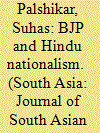

|
|
|
|
|
| Summary/Abstract |
Will the BJP pursue its Hindutva ideology while in power or will it now gradually become a ‘centrist’ party? Responding to this question, the present paper argues that the possibility that it would transform into a centrist party is rather dim for four reasons: 1) the mixing of Hindutva identity with the development agenda during the national election campaign in 2014; 2) the mild and covert pursuit of Hindutva by both party and government; 3) the dynamic, but deep-rooted relationship between Hindutva and the BJP; and 4) most importantly, the slow and imperceptible shifting of the middle ground of public opinion in India in favour of majoritarian (and therefore pro-Hindutva) sentiment.
|
|
|
|
|
|
|
|
|
|
|
|
|
|
|
|
| 2 |
ID:
138279
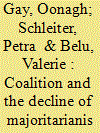

|
|
|
|
|
| Summary/Abstract |
The United Kingdom has traditionally featured many aspects of the majoritarian model of democracy: its first-past-the-post electoral system tends towards producing single-party majorities, while its legislative decision rules concentrate policy-making power in the hands of the resulting single-party governments. However, in an unprecedented break with the UK's postwar conventions, the Conservatives and Liberal Democrats formed a coalition following the general election of 2010. In this article, we examine some of the Coalition's impacts on governing and constitutional conventions, placing them in a comparative European context. We conclude that the Coalition reflects a shift towards the less majoritarian forms of politics prevalent in continental Europe, and that some of these changes are likely to persist even after the end of the current government.
|
|
|
|
|
|
|
|
|
|
|
|
|
|
|
|
| 3 |
ID:
111198
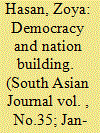

|
|
|
| 4 |
ID:
159722
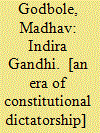

|
|
|
|
|
| Publication |
New Delhi, Manas Publications, 2018.
|
| Description |
440p.hbk
|
| Standard Number |
9788170495505
|
|
|
|
|
|
|
|
|
|
|
|
Copies: C:1/I:0,R:0,Q:0
Circulation
| Accession# | Call# | Current Location | Status | Policy | Location |
| 059436 | 954.051/GOD 059436 | Main | On Shelf | General | |
|
|
|
|
| 5 |
ID:
181336
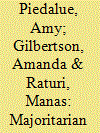

|
|
|
|
|
| Summary/Abstract |
This paper explores media coverage of instant ‘triple talaq’—a form of divorce practised by some Indian Muslims—and ‘love jihad’—a supposed trend of Muslim men coercing Hindu women into conversion and marriage. The Hindu Right position itself as champions of gender justice in the context of outlawing instant triple talaq, but in discussions of ‘love jihad’ sideline women’s rights (to choose their own religion and spouse) and focus on national security. This reveals the strategic use of women’s rights by the Hindu Right to further entrench its imagination of a secular Hindu nation threatened by the Muslim man.
|
|
|
|
|
|
|
|
|
|
|
|
|
|
|
|
| 6 |
ID:
126914
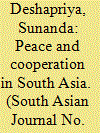

|
|
|
| 7 |
ID:
172884
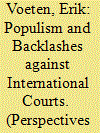

|
|
|
|
|
| Summary/Abstract |
International courts, like domestic courts, protect liberal limits on majoritarianism. This sometimes puts these courts in a position to protect the property rights of the “corrupt elites” that are targeted by populists or the civil liberties of those who are targeted in domestic populist identity politics. Moreover, populism offers an ideology to attack the authority of a court rather than just its individual rulings. An empirical examination illustrates the plausibility of this argument. A large number of backlashes against international courts arise from judgments that reinforce local populist mobilization narratives. Populist backlashes against international courts are not just about sovereignty but often follow efforts to curb domestic courts, usually for similar reasons. Yet populist backlashes do not always succeed, either because populist leaders do not follow up on their exit threats or because populism is too thin an ideology for creating successful multilateral reform coalitions.
|
|
|
|
|
|
|
|
|
|
|
|
|
|
|
|
| 8 |
ID:
129845
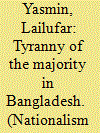

|
|
|
|
|
| Publication |
2014.
|
| Summary/Abstract |
This article analyzes how the construction of a national ideology in Bangladesh has been achieved through a style of majoritarianism based on "positional dominance." This has resulted in the construction of a national identity that is based on a particular form of Bengali identity that subsumes and indeed delegitimizes other claims to identity within the state, including claims made by indigenous communities to their own distinctive, place-based identity. Although a formal peace treaty has been signed, peace remains elusive due to the cultural hegemony of Bengalis over the indigenous peoples in the name of the supremacy of the national state.
|
|
|
|
|
|
|
|
|
|
|
|
|
|
|
|